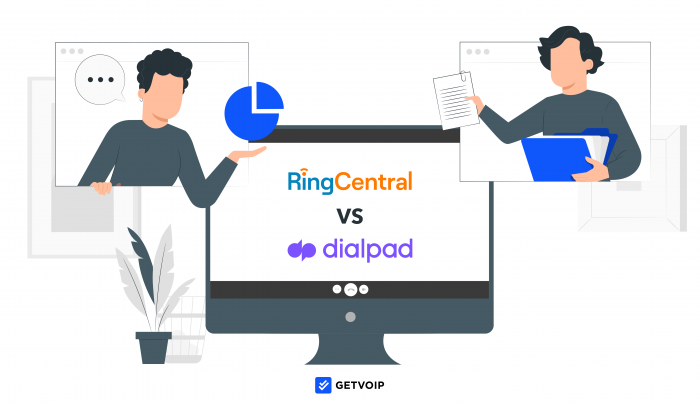Our verdict: RingCentral offers a secure platform with a plethora of advanced features including real-time analytics that is perfect for enterprises and small call centers, while Dialpad’s reliable and affordable virtual phone system with cutting edge AI tools such as real-time call transcription is a great choice for SMBs.
Summary
Below, we’ve compared RingCentral vs. Dialpad across 8 categories.
| Category | Winner |
| Price | Dialpad: With prices starting at $15/user/month, Dialpad is the more affordable option |
| Channel Flexibility | Draw: RingCentral has a stronger video chat app with unlimited storage, while Dialpad offers more outbound texts per user |
| User Experience | Dialpad: RingCentral’s UI is much harder to navigate than Dialpad’s clean, intuitive interface |
| Phone System | Draw: RingCentral offers more advanced voice calling features, but Dialpad is more affordable |
| Team Messaging | Draw: RingCentral and Dialpad offer similar team messaging tools |
| Video Conferencing | RingCentral: RingCentral offers a more secure video calling platform with a higher meeting participant cap, and in-meeting features to enhance attendee engagement |
| Analytics and Reporting | RingCentral: RingCentral offers more options and customizability with its analytics dashboard than Dialpad |
| Integrations | RingCentral: With over 300 integrations, RingCentral is the clear winner here |
We recommend RingCentral if you need:
- To better manage high inbound call volumes: RingCentral includes many advanced call routing strategies, call queues, digit extensions, a receptionist console, and IVR
- A robust video conferencing platform: RingCentral’s video conferencing tool is secure, reliable and packed with features such as screen sharing, whiteboard and breakout rooms
- Superior security: RingCentral offers exceptional security standards including end-to-end encryption, single sign on, and HIPAA compliance
We recommend Dialpad if you need:
- An affordable business phone system: Dialpad is one of the most affordable solutions in the UCaaS space offering a fully-featured platform including voice, messaging and video capabilities
- Superior artificial intelligence tools: Dialpad has years of experience developing communication AI and NLP tools like meeting transcription and real time analytics
- A solution for your sales team: Dialpad includes a generous number of outbound SMS messages in its plans. Additionally, Dialpad’s AI Sales Center product offers many features built specifically for sales teams such as real-time assist, power dialer, etc
Research Methodology
In comparing these two providers we looked at:
- Pricing: How much it really costs to use each solution including plans, add-ons, and hidden fees
- Features: Both providers include essential VoIP features like caller ID, so we’ll focus on the capabilities that make each provider stand out, especially analytics and video conferencing
- Call quality: We considered the reliability of each system and how likely users would be to experience issues such as jitter
- Security: We looked at the security features and compliance certificates each provider offers
- Integrations: We took a look at how compatible each solution is with third-party apps
What is RingCentral?
RingCentral is a cloud-based business communication solution providing VoIP calling, team chat and SMS messaging, video conferencing, contact center software, and more.
With three plans that each grant unlimited phone calls and SMS for RingCentral customers, it’s not much of a surprise that the company is steadily making gains in the industry. These plans vary enough to fit any business size – the Core Plan is ideal for small businesses, while the Ultra Plan suits enterprise-level organizations needing advanced features like call center management.
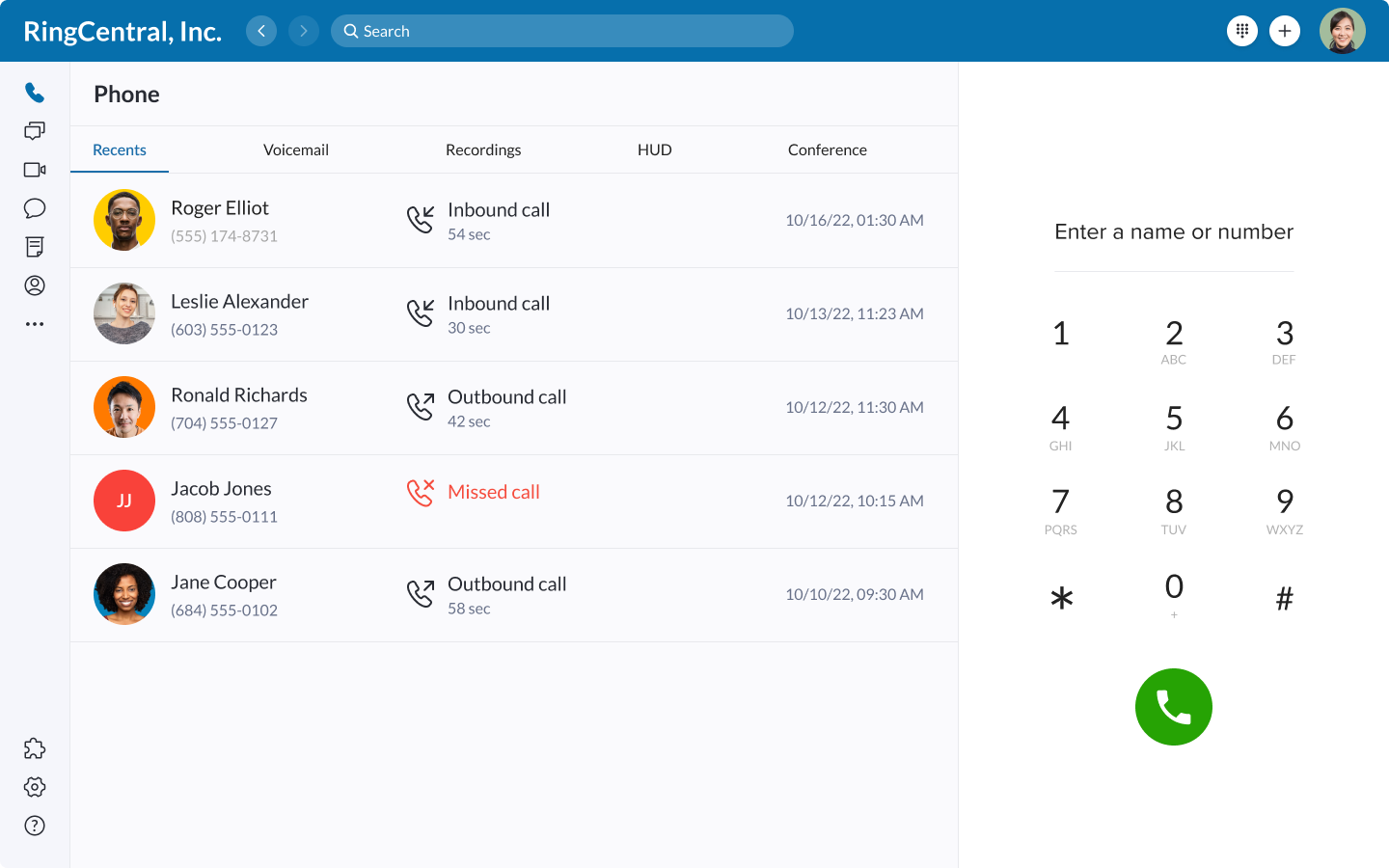
What is Dialpad?
Dialpad is a VoIP solution with unified communications features geared towards small to mid-sized businesses. Dialpad pricing and plans include a three-tiered structure that is slightly leaner than RingCentral–but Dialpad is much more affordable.
Dialpad supports desk phones, desktop software, and smartphones via Android and iOS softphone apps. It also provides access to thousands of local and toll-free business phone numbers. Inbound calls will ring on all connected devices on your Dialpad account simultaneously, or you can program them to be run in a preset rotation.
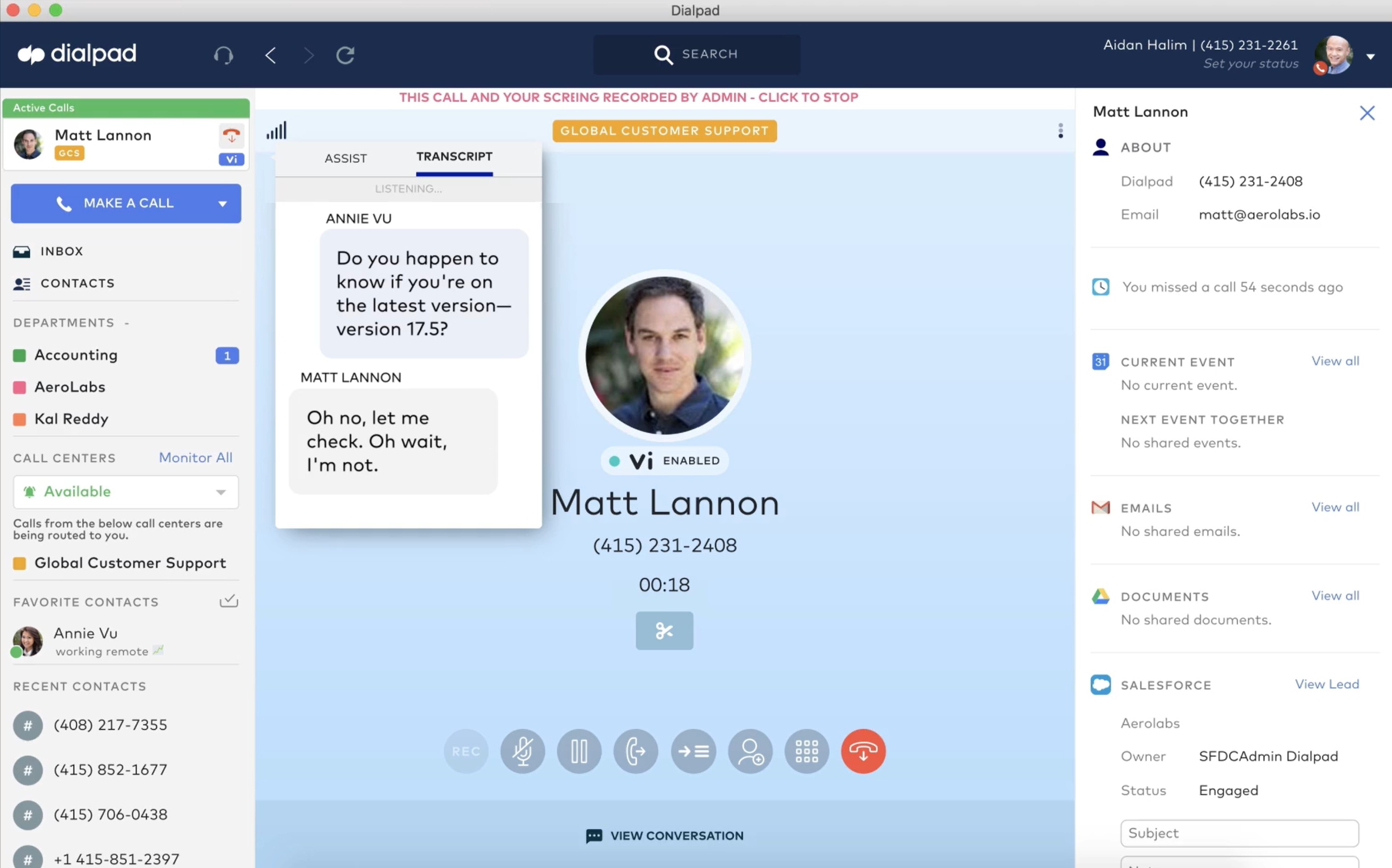
RingCentral vs. Dialpad: Pricing Overview
RingEX offers three plans
- Core plan ($20 monthly per user): Includes all RingCentral’s basic channels and phone-system features, unlimited multi-level IVR, on-demand call recording, and basic call queues. Core video meetings have a 100-participant maximum.
- Advanced ($25 monthly per user): Adds on intelligent call distribution, queueing rules, automatic call recording, and the full analytics suite. It includes all integrations and allows administrators to customize user roles and permissions.
- Ultra ($35 monthly per user): Includes enterprise-grade HD video meetings with AI-powered meeting tools such as live transcription. It also includes enhanced analytics like custom dashboards, weekly report subscriptions, and wallboard views.
Dialpad also offers three plans:
- Standard plan ($15 per user per month): Includes unlimited calling, video meetings, and team messaging along with AI-powered voicemail transcription and real-time analytics.
- Pro plan ($25 per user per month): Adds on ring groups, local number support in 70 countries, CRM integrations and 24/7 live support.
- Enterprise plan: Adds on 100% uptime SLA, unlimited ring groups, priority live agent support, and dial-by-extension.
RingCentral vs. Dialpad: Feature Comparison
Here, we’ve compared the top features of RingCentral vs. Dialpad:
Phone System Features
Summary: Both phone systems offer unlimited calling along with a robust set of features, but RingCentral includes a higher level of security along with a few extra features, although at a higher price point than Dialpad.
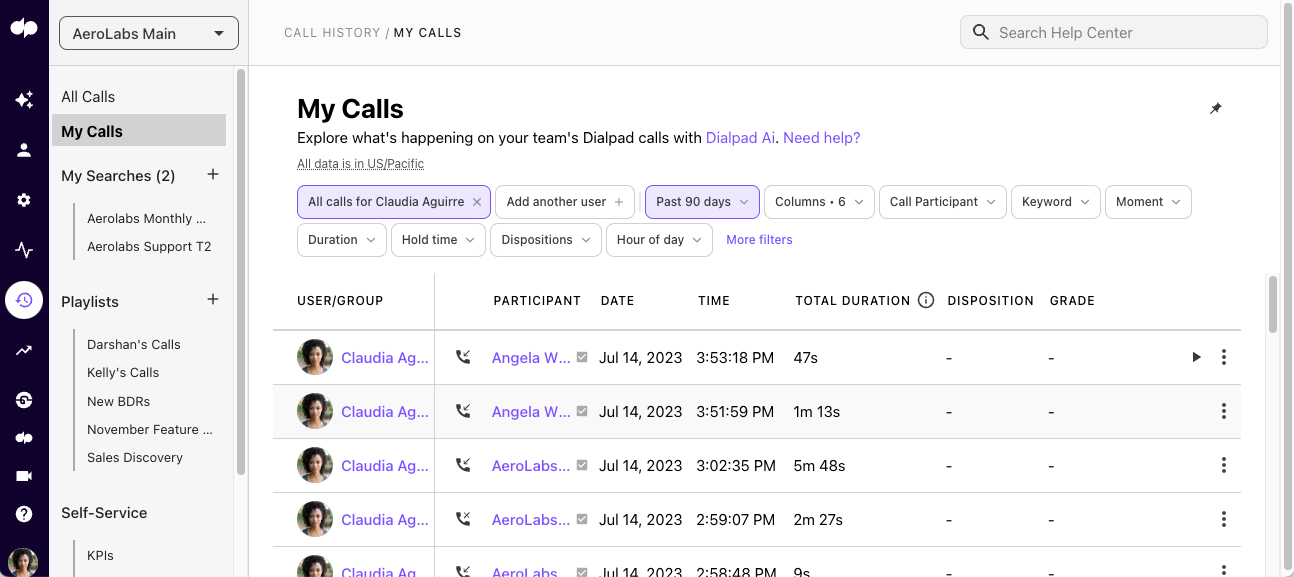
Shared Features
- Multi-level auto attendant
- Visual voicemail
- Ring Groups
- Call queues
- Custom call routing
- Three way calling
- Caller ID
Differences
- End to end encryption for calls: Only offered by RingCentral
- Hardware: Only RingCentral offers dek phone and conference phone rentals
- Push to talk: Walkie talkie feature only offered by RingCentral
- Hot desking: Only offered by RingCentral
Team Messaging and SMS Features
Summary: RingCentral offers better security and more options when it comes to integrations, but Dialpad includes 250 outbound SMS/MMS messages per user per month in all plans, which is much more generous than RingCentral.
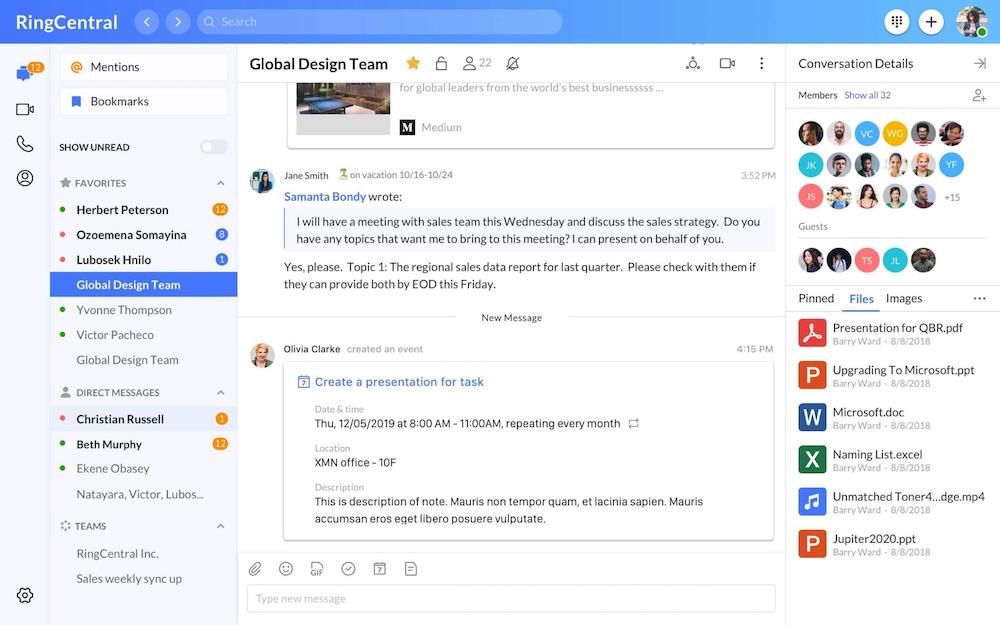
Shared Features
- Topic based team messaging
- Enhanced business SMS and MMS (Users can send texts and files from their business phone number to contacts)
- File sharing
- Search files and messages
- Alerts and notification management
- 1:1 and group messaging
- Emoji reactions
Differences
- Storage limits: RingCentral offers unlimited storage in its Enterprise plan, Dialpad does not
- End to end encryption for messaging: Only offered by RingCentral
- SMS Integrations: RingCentral offers out-of-the-box prebuilt SMS integrations, while Dialpad offers a more limited number of CRM integrations.
- Outbound SMS: Dialpad includes 250 outbound texts per user, per month. After that texts are charged on a per-message basis. RingCentral includes 25-200 texts per user, per month, depending on the plan
- International SMS: RingCentral will enable international texting at a user's request (texts are charged on a per message basis), while Dialpad does not offer international SMS
Video Conferencing Features
Summary: Dialpad offers a secure and solid video conferencing solution but the participant limit is only 10 (larger companies can purchase a Dialpad Meetings subscription and host up to 150 participants). RingCentral conversely allows up to 200 participants and has a fully featured video solution with breakout rooms, whiteboard, closed captioning and more.
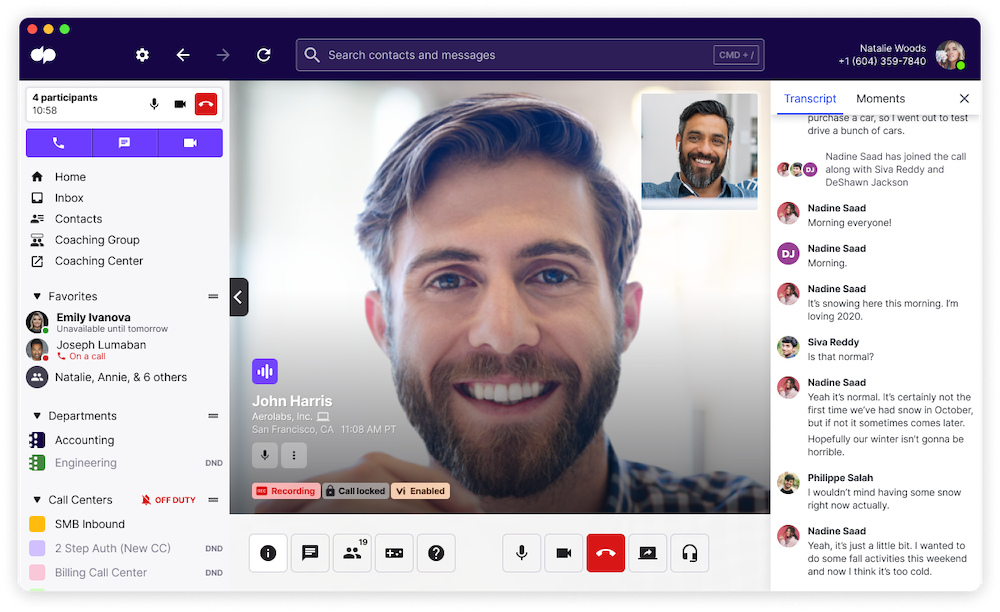
Shared Features
- HD Video and audio
- Join by desktop, dial in or mobile browser
- Mobile app
- Waiting room
- Screen sharing
- Virtual backgrounds
- Screen, video and audio recording
- In-meeting chat
- AI powered meeting transcription
- Locked meeting rooms
- HIPAA compliance
Differences
- Whiteboard: Dialpad offers whiteboard through a Miro integration while RingCentral includes a native whiteboard tool.
- Participants: Dialpad limits participants to 10 unless Dialpad Meetings is purchased while RingCentral allows up to 200 video participants.
- Breakout rooms: Only offered by RingCentral
- Duration limits: Dialpad has a 5 hour duration limit whileRingCentral has a 24 hour duration limit on video meetings.
Analytics and Reporting Features
Summary: RingCentral offers a more robust analytics platform especially with its Business Analytics Pro tool which is available as an add on and included in the Ultra plan. Dialpad, however, offers more AI-powered analytics tools including real-time call transcription.
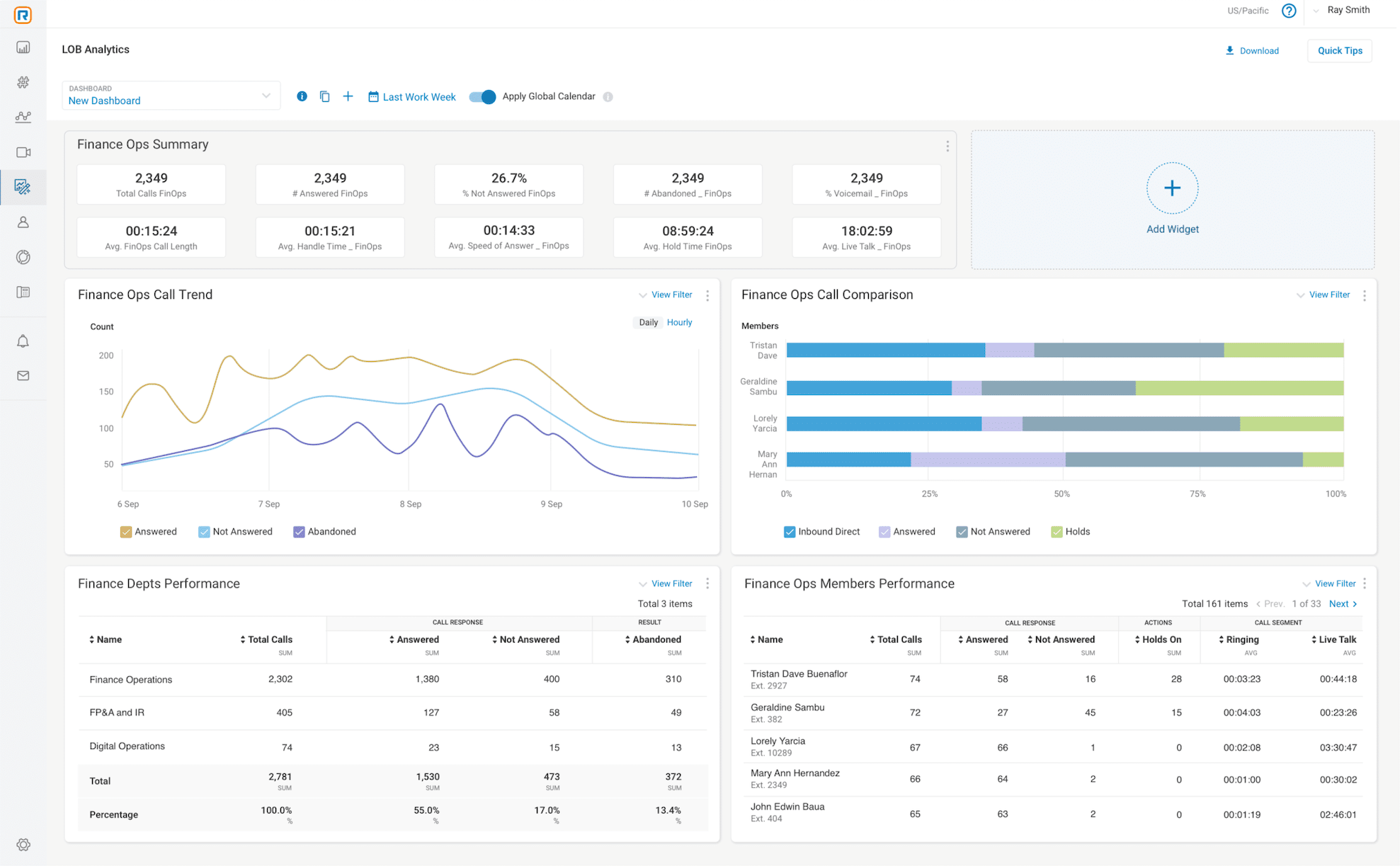
Shared Features
- Real time analytics
- Historical reporting
- Call log reports
- Quality of service (QoS) reports
- Calendar and data filtering
- Export analytic data
- Scheduled reports
- Chart or graph data
- Customizable dashboards
Differences
- Real-time queue management: RingCentral offers as an add-on while Dialpad does not offer queue management for its business communications solution.
- Adoption and usage analytics: Only offered by RingCentral
- Dashboard sharing: Only offered by RingCentral as part of the Business Analytics Pro add on package
- Real time call transcriptions: Only offered by Dialpad
Integrations
Summary: Compared to Dialpad, RingCentral has hundreds more integrations. If you want to integrate with several programs and systems, RingCentral comes out far ahead.
Shared Features
- Productivity integrations (Google Workspace)
- CRM integrations (Salesforce, ServiceNow, Microsoft Teams, etc.)
- Open APIs & webhooks
- Single Sign On (SSO) (Okta, Azure & OneLogin)
- Collaboration integrations: Slack
Differences
- Number of options: RingCentral uniquely offers over 300 out of the box integrations, making it one of the largest integration ecosystems in the VoIP space.
RingCentral vs Dialpad Pros & Cons
RingCentral Pros
- Extensive Integration Support: RingCentral has over 300 integrations to provide a truly versatile platform
- Detailed Analytics: The RingCentral Analytics portal lets you send out customized reports with various KPIs. These include average call duration, quality of service, first call resolution, and 30 metrics that you can monitor live
- Large Capacity: RingCentral video conferences can support up to 200 participants at once
RingCentral Cons
- Learning Curve: Since RingCentral has so many native features, new users may face a rather steep learning curve. Certain UI elements on the mobile app could also be improved to be more intuitive
- Expensive: RingCentrl’s platform is pricey compared to competitors, especially if add-ons or increased texting capacity is needed
- Outbound texting prices: RingCentral only includes 25-200 outbound texts per user per month, after that companies have to pay per text
Dialpad Pros
- Voicemail Transcription: The transcription feature is available on the Standard plan and is more accurate than most alternatives
- Unlimited Video Recordings: Those who upgrade to the business version of Dialpad Meetings will be able to create unlimited video recordings
- Local Number Support in Over 50 Countries: Dialpad lets you use local numbers in over 50 countries
Dialpad Cons
- Small Meeting Capacities: Dialpad’s video conferencing is limited to 10 participants unless users purchase an additional Dialpad Meetings subscription which allows up to 150 participants
- Security: Dialpad lacks the end-to-end encryption on calls and messaging that RingCentral offers
- Lack of International SMS: At the time of this writing, Dialpad does not offer international SMS texting
RingCentral and Dialpad are two of the best business VoIP options available on the market today. They both offer VoIP-based business phone systems that have key features for keeping teams communicating. However, the best software for your business will depend on your business needs, calling area, budget, and the communication channels your customers use most.


